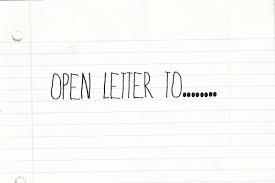Dear Music Coorporation of America,
When I asked for permission to record John Williams’ legendary composition ‘Theme from Schindler’s List’ on my new album, your company rejected the request because of the ‘commercial value’.
For a minute, I just assumed to have walked the right path here, in order to get permission. To me, it’s a decent routine I’ve been following ever since 2005, when I started my own little record label.
Permission denied? This can’t be true, I thought. Shouldn’t anyone who gets asked by someone to play his or her composition, feel honored in some way? Or at least feel sympathy for the poor soul, struggling out there to master the genius music of — in this case — John Williams that he or she loves to share. Remember, this is jazz, so it’s about 235,000% more likely that an incoming permission request is about some Bieber-ish kind of crap, but this one happens to be about your music. So, was this an automated answer or should you publishing folks react a little more thoughtful?
Nah, I must be wrong.
Wait a minute. We’re talking 2012, where every home-taped fart of every baby guinea pig is quickly the most watched media on the planet. Everybody is stealing from everybody and although it’s one of the global changes we should’t be fighting, the straws of copyright are generally more disrespected now, than in any other era of civilized history — easily and massively. Here is someone who takes the time and the responsibility to pro-actively request a permission, wait a minute, it must be somebody with care and respect towards other people’s ownership rights! Still that wasn’t enough. Or you just don’t seem to have noticed.
Was I missing something here?
The great John Williams touched the lives of hundred millions of people (and counting) while being regarded as one the finest and strongest original American classical composers of the 20th century. His oeuvre is unparallelled and his work is uncompromised. To a certain extent, Williams’ fabulous cultural contributions might be called ‘commercial’ because of the huge success of the blockbuster movies his work is associated with. But that’s not true. As his work is widely performed, shared and exploited, it is also protected — and it should be — but the music itself is not commercial by nature. Nor is it commercial by intent.
Enters the permission request of this would-be saxophone player from Holland (wasn’t that the capital of Denmark?). In my request, I said to expect a sale of a humble 100-200 downloads. Through the years I’ve sold a couple of thousand albums, but hey, this is 2012 baby. So the number actually could not be far from the truth.
Having said that, when I understood that a publisher rep called my music ‘commercial’ this seemed to me, albeit a very bad one, to be one of the biggest jokes I ever came across (and believe me, I know a music joke or two).
I do not know the person in the suit who wrote it, but he or she is either confusing me with a new boy band (which I will take as a compliment), too lazy to Google me, too busy checking the stock market or Farmville (what’s the difference anyway), has never been in a Dutch jazz venue (chances are high though, since they are usually just a block away from the Red Light District) or dramatically overpaid.
It’s not your kind of people’s fault, you publishers, sub-publishers and sub-sub-publishers. Although one might have to look for them with a Sherlock Holmes-style magnifying glass, there are good guys out there. I can tell. They email me back and stuff! The good guys know it: we’re all on the same boat.
Well, for you I hope that John Williams doesn’t personally find out about this. You’ve probably forgotten the path he has walked to become the world class composer he is. I don’t doubt his integrity but I do doubt yours. I believe Williams would welcome anyone with a decent story or vision to play his music. If not taking any effort or time to formulate a profound answer is the way you treat your fellow music peers, we might as well close the whole business now. But we won’t. And then again, Williams just might still not approve for very good reasons. Then what’s this ‘commercial’ thing? Let’s dig a little more.
If you think investing $10,000 and working my ass off for 2-3 years to fill my saving socks again is ‘commercial’, think again.
So the ‘commercial’ thing must be something else?
If you think that choosing a John Williams tune is a means to have a popular, ‘well known’ work in my repertoire (in order to be successful), you missed the point. As a player, it’s a tour de force, a masterpiece, it has to be studied for years. It requires maturity, skill and talent to play. I’m not Isaac Stern, but it’s a privilege to make my talent work to enrich and touch other people’s lives as a profession — just like my hero John Williams does. It’s about what we all like to do: to celebrate the work of our heroes. As a lover of music, I still am deeply touched by the Schindler’s List tune (I don’t know if you’re familiar with that kind of feeling), for so many years. Every day, the magic of his music is as alive as it’s ever going to be. Still, nothing ‘commercial’ there.
If you think playing jazz has anything to do with being ‘commercial’, come see me in the rehearsal room, writing and practicing stuff, working the details and crying my head out because I fail to meet the standards that are set by the great predecessors of all the timeless music I cherish more than anything.
Come sit with me in the morning, after a 3-4 hour sleep, while I am being laughed at by mortgage brokers when I show them my tax forms. How ‘commercial’ is that?
Even better still, come see me play in a jazz club at 1:30 am and join me afterwards for a cup of tea, not before I paid my $20 parking ticket and filled in my gig administration (note the word ‘mini’) for a $21 net fee. While we sit in the car, you might just get lucky hearing a great Joe Henderson record.
Which I paid for.
Which brings me to another question. There must be this group of people who did earn all the money that music lovers were happy to spend, back in the days. Have you seen them? Well, those days are over, they say. If the publishers are not the ones responsible for the fact that the music industry is more than 15 years late in understanding the changes of our time, I’d love to hear it. From a creative point of view, being over-protective might be the last thing we could use. But fair enough, that’s another story.
Let’s wrap it up.
As an artist, I love to be independent. But I can’t do things alone. And I won’t. For now: I don’t need your permission anymore. I won’t record it. I don’t approve either. But if you don’t want your music to be heard, I respect that.
Even with the hassle, I am in a lucky place, not having to worry if my work is appreciated, bought and shared — or even ripped. I don’t care what way I have to find to reach people. We as music inventors, producers and manufacturers should make music available. And we should work with each other, not against.
Keep the music alive.
Cheers, with love from Holland,
Tom Beek
















